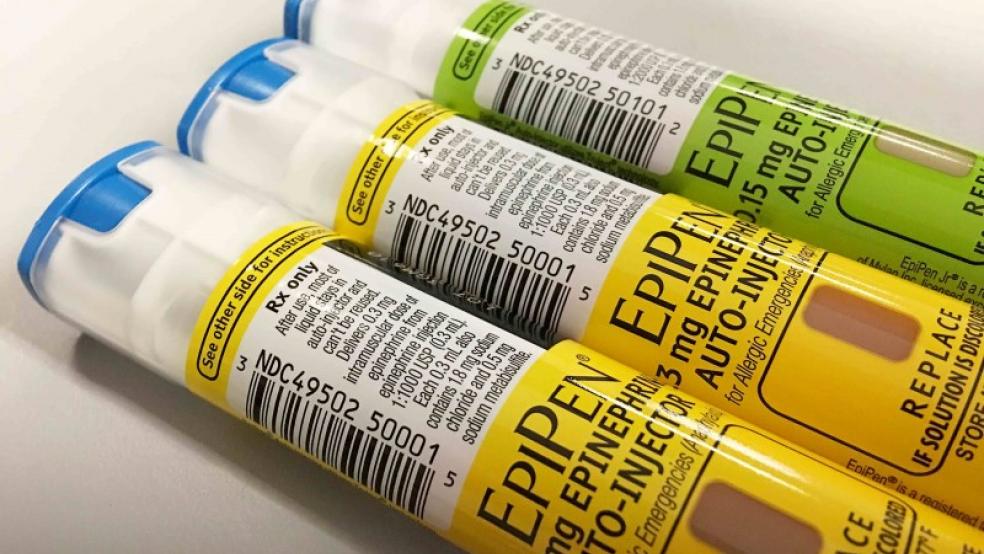-
Tips for becoming a good boxer - November 6, 2020
-
7 expert tips for making your hens night a memorable one - November 6, 2020
-
5 reasons to host your Christmas party on a cruise boat - November 6, 2020
-
What to do when you’re charged with a crime - November 6, 2020
-
Should you get one or multiple dogs? Here’s all you need to know - November 3, 2020
-
A Guide: How to Build Your Very Own Magic Mirror - February 14, 2019
-
Our Top Inspirational Baseball Stars - November 24, 2018
-
Five Tech Tools That Will Help You Turn Your Blog into a Business - November 24, 2018
-
How to Indulge on Vacation without Expanding Your Waist - November 9, 2018
-
5 Strategies for Businesses to Appeal to Today’s Increasingly Mobile-Crazed Customers - November 9, 2018
Mylan CEO infuriates lawmakers at hearing on EpiPen costs
Members of a congressional committee grilled Mylan CEO Heather Bresch during a Capitol Hill hearing Wednesday concerning the dramatic price increase of the company’s EpiPen product. Today’s hearing follows several other hearings about other drug companies raising the price on older drugs. “They raised the price to get filthy rich at the expense of our constituents”, said Rep. Cummings.
Advertisement
“I’m concerned that is a rope-a-dope strategy”, Rep. Elijah Cummings of Maryland, the ranking Democrat on the committee, said in his opening statement. Rep. Eleanor Norton, who represents the District of Columbia, asked what Bresch had done to deserve a 671 percent pay increase while the price of EpiPens also increased. The wholesale price for a package of two autoinjectors has risen from $94 in 2007 to $608 this year, according to data from Truven Health Analytics.
“I know there is considerable concern and skepticism” about the price hikes, but net revenue for Mylan had increased at a much smaller rate, Bresch said.
She also argues that Mylan doesn’t profit as much as might be expected given the list price.
The hearing came after more than a month in which Mylan and Bresch have come under fire for the price hike.
But Heather Bresch, Mylan’s chief executive, stayed firm in her message that the list price of EpiPen had increased because of the inherent complexity of the pharmaceutical marketplace and that few patients were paying the list price. Her salary was $18 million over the same period, she said.
Medicare Part D spending on EpiPen injectors, for example, grew by an astounding 1,151 percent between 2007 and 2014 – from $7 million to $87.9 million- while the number of beneficiaries rose by just 164 percent, according to a new study by the Kaiser Family Foundation released this week.
EpiPens are devices for injecting epinephrine during emergencies when a patient is experiencing a serious allergic reaction. Bresch’s father is Sen.
Mylan then launched a program that gave away 700,000 free EpiPens to over 66,000 schools “with no strings attached”, she said. Joe Manchin III of West Virginia, worked her way up the ladder at Mylan and was named CEO in 2012. Cummings asked, clearly frustrated that Mylan had not provided documents to answer the question and requesting that Bresch furnish the information to the committee.
But after hours of grilling the CEO, lawmakers received little insight into Mylan’s pricing policy.
But despite the tough grilling, questions remain as to whether individuals, and states like CT that pay millions of dollars for EpiPens through Medicaid, are paying a fair price.
Lawmakers are trying to determine whether Mylan made more money on EpiPen than warranted from state Medicaid programs by having it classified as a generic product, resulting in much smaller rebates to the government health plans. The price has not only drawn national criticism, but also locally from Lewis University students who rely on the use of epinephrine auto-injector. Many schools also stockpile the devices under 2013 legislation, signed by President Obama, that encourages the practice. “Lower the price so people can afford it”.
Mylan recently said it would offer direct assistance to people with high out-of-pocket costs while expanding its program for the uninsured and underinsured, so many more families would not have to pay anything for the EpiPens.
But he noted that since his drug is not considered a true generic of EpiPen, one challenge is that if a physician writes “EpiPen” on a prescription, it can not be substituted by a pharmacist in more than half of states without rewriting the prescription.
Bresch says to cut costs to consumers, Mylan will start offering a cheaper, generic version and increase access to a discount card.
Advertisement
This article was originally published at 2:30 p.m. September 21.





























